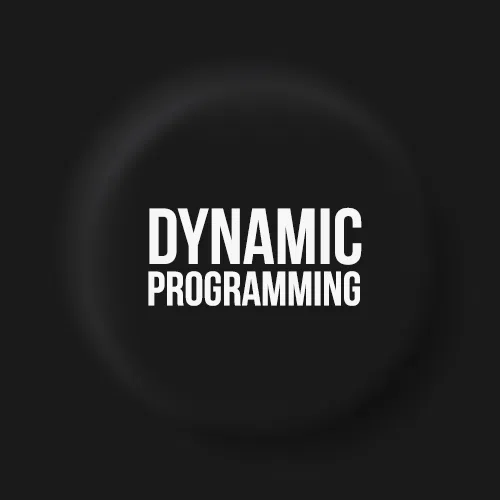

Discover a smoother learning journey through our effortless roadmap
Dynamic Programming (DP) Tutorial with Problems
What is memoization? A Complete tutorial
Overlapping Subproblems Property in Dynamic Programming | DP-1
Optimal Substructure Property in Dynamic Programming | DP-2
Steps for how to solve a Dynamic Programming Problem
Tabulation vs Memoization
Greedy Approach vs Dynamic programming
Comparison among Greedy, Divide and Conquer and Dynamic Programming algorithm
Nth Fibonacci Number
Program for factorial of a number
Coin Change - Count Ways to Make Sum
Longest Common Subsequence (LCS)
Longest Increasing Subsequence (LIS)
Maximum Subarray Sum - Kadane's Algorithm
0/1 Knapsack Problem
Unbounded Knapsack (Repetition of items allowed)
Maximum sum rectangle in a 2D matrix | DP-27
Maximum size square sub-matrix with all 1s
Longest Palindromic Subsequence (LPS)
Longest Palindromic Substring
Longest Common Increasing Subsequence (LCS + LIS)
Shortest Common Supersequence
Maximum Product Subarray
Egg Dropping Puzzle | DP-11
Partition a Set into Two Subsets of Equal Sum
Word Break Problem | DP-32 | Set - 2
Box Stacking Problem | DP-22
Floyd Warshall Algorithm
Longest Bitonic Subsequence | DP-15
Word Wrap Problem
The Painter's Partition Problem
Matrix Chain Multiplication
Best Time to Buy and Sell Stock IV (at most k transactions allowed)
Maximum size rectangle binary sub-matrix with all 1s
Count Distinct Subsequences
Wildcard Pattern Matching
Travelling Salesman Problem using Dynamic Programming
Longest Increasing Path in Matrix
Longest Zig-Zag Subsequence
Introduction to Dynamic Programming on Trees
Maximum height of Tree when any Node can be considered as Root
DP on Trees | Set-3 ( Diameter of N-ary Tree )
Maximal Point Path
Maximum Path sum in a N-ary Tree
Count Ways To Assign Unique Cap To Every Person
Bitmasking and Dynamic Programming | Travelling Salesman Problem
Partition of a set into K subsets with equal sum using BitMask and DP
Digit DP | Introduction
Longest subsequence such that adjacent elements have at least one common digit
Count of N digit numbers which contains all single digit primes
Count of N-digit numbers with at least one digit repeating
Count numbers from a given range whose product of digits is K
Count numbers in range [L, R] having K consecutive set bits
Count the numbers with N digits and whose suffix is divisible by K
Count of integers from the range [0, N] whose digit sum is a multiple of K
Count Numbers in Range with difference between Sum of digits at even and odd positions as Prime
Count numbers in given range such that sum of even digits is greater than sum of odd digits
Top MCQs on Dynamic Programming with Answers
Our Complete Guide to Dynamic Programming offers a comprehensive overview of this powerful problem-solving technique. Whether you're an experienced coder looking to enhance your skills or a beginner aiming to master this essential concept, this guide equips you with the knowledge and tools to efficiently solve complex problems by breaking them down into manageable subproblems.
While learning about Dynamic Programming in this Complete Guide on Dynamic Programming, you will come across some common terms that will be used multiple times. Some of these terms are:
Dynamic Programming is needed to efficiently solve complex problems by breaking them into smaller, solvable subproblems, saving time and resources in finding optimal solutions.